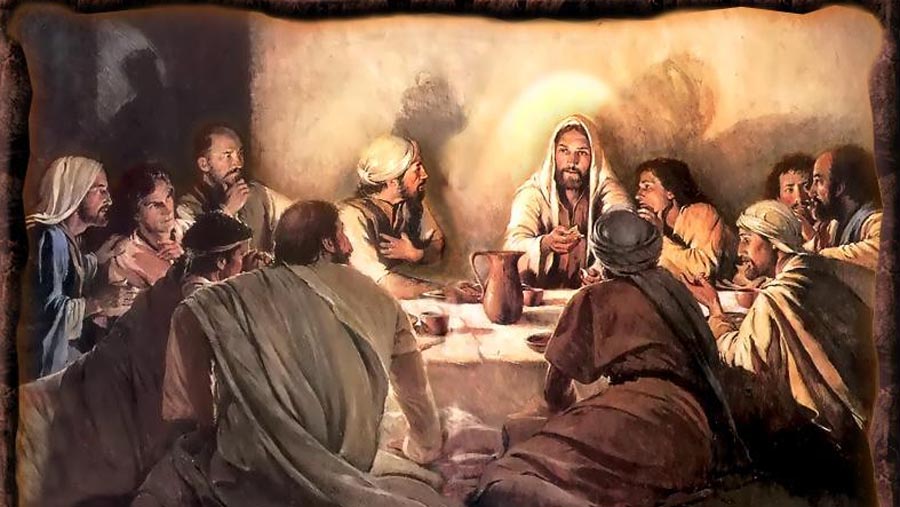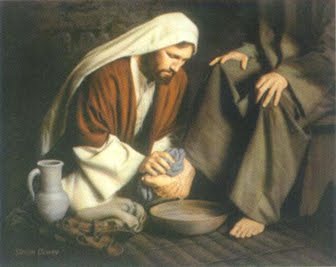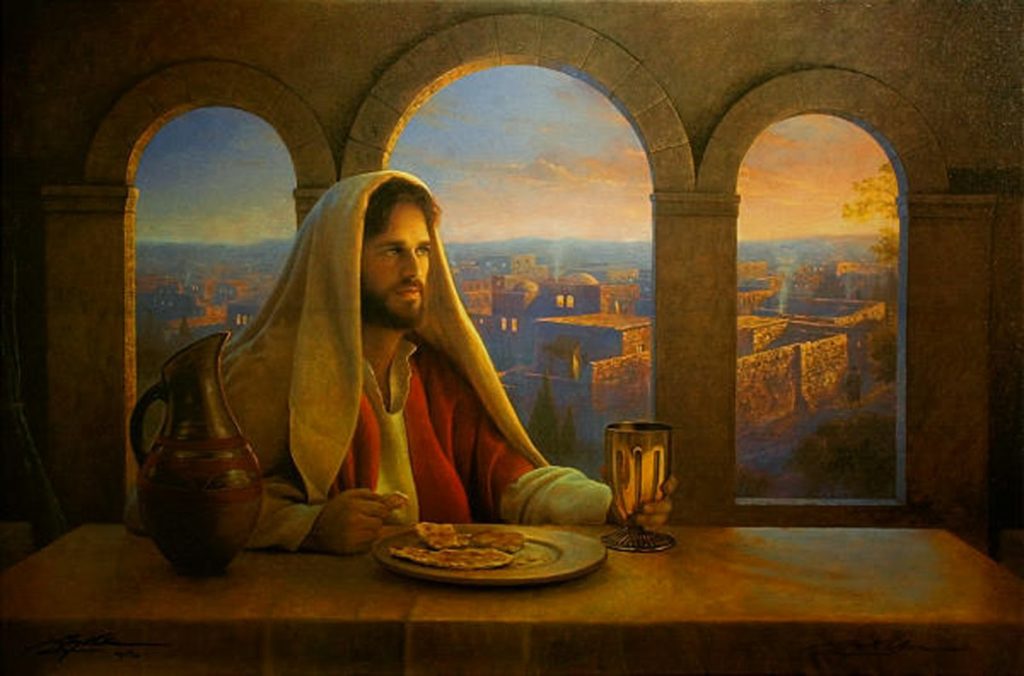The Last Supper
Then, on the first day of Unleavened Bread, traditionally the day when the Passover lamb was to be sacrificed, Jesus called to Peter & John and said, “Go and prepare the Passover meal for us that we may eat of it.” In return they asked him, “Where would you like us to make preparations for it?” And he answered, “Go into the city, where a man carrying a water jar will meet you. Say to him: ‘The Teacher says – My time is near. I will keep Passover at your house with my disciples.’ Then follow him, and whatever home he enters, say then to the owner of that house: ‘The Teacher asks — Where is my guest room, that I might eat the Passover there with my disciples?’ he will then show you a large room upstairs, furnished and ready for us. Make our preparations there.” So the disciples set out and went into the city as Jesus had directed, and found everything just as he had told them, and they prepared the Passover meal. [Matthew 26:17-19, Mark 14:12-16 & Luke 22:7-13]
When it was evening and the hour came, Jesus arrived and took his place at the table with the twelve, and said to them, “I have eagerly desired to eat this Passover with you before I suffer; for I tell you, I will not eat until all is fulfilled in the Kingdom of God.” [Luke 22:14-16]
Then Jesus, knowing that the Father had given all things into his hands — and that he had come from God and was going to God, got up from the table, took off his robe, and tied a towel around himself. He then poured water into a basin and began to wash the disciples’ feet and to wipe them with the towel that was tied around him. He came to Simon Peter, who said to him, “Lord, are you going to wash my feet?” And Jesus answered, “You do not know now what I am doing, but later you will understand.” Peter said to him, “You will never wash my feet.” Jesus answered, “Unless I wash you, you have no share with me.” To which Simon Peter said to him, “Lord, not my feet only but also my hands and my head!” And Jesus said to him, “One who has bathed does not need to wash, except for the feet, but is entirely clean. And you are clean, though not completely.” [John 13:3-10]
After he had washed their feet, Jesus put back on his robe, and returned to the table. He then said to them, “Do you know what I have done for you? You call me Teacher and Lord—and you are right, for that is what I am. So if I, your Lord and Teacher, have washed your feet, you also ought to wash one another’s feet. For I have set you an example, that you also should do for each other as I have done for you. Very truly, I tell you, servants are not greater than their master, nor are messengers greater than the one who sent them. If you understand these things, you are blessed when you do them.” [John 3:12-17]
A short time later, while they were eating, he said to them, “Truly I tell you, one of you will betray me, one who is even now eating with me. The one who betrays me is with me, and his hand is even now on the table, for the Son of Man is going as it has already been determined. And yet woe to the one by whom he is betrayed. It would have been better for that one not to have been born!” And the disciples began to be distressed and ask one another which of them it could be who would do this. Then they turned to Jesus one after the other and asked, “Surely, not I?” And Jesus answered, saying “I am not speaking of all of you; I know whom I have chosen. The one who has dipped his hand into the bowl with me will betray me. And this is to fulfill the scripture: ‘The one who ate my bread has lifted his heel against me.’ I tell you this now, before it occurs, so that when it does occur, you may believe that I am. Very truly, I tell you, whoever receives one whom I send receives me; and whoever receives me receives him who sent me.” Judas then spoke up and asked, “Surely, not I, Rabbi?” And Jesus replied, “You have said so.” Then Simon Peter motioned to one of the disciples to speak more clearly about who would betray him, and that disciple – the one whom Jesus especially loved – leaned over and asked Jesus, “Lord, who is it?” And Jesus answered him, “It is the one to whom I give this piece of bread after I have dipped it into the dish.” And then he dipped his bread, and gave it to Judas, the son of Simon Iscariot. [Matthew 26:20-25, Mark 14:17-21, Luke 22:21-23 & John 13:18-26]
And after receiving the bread, Satan seemed to enter into Judas, and Jesus said to him, “Go and do quickly what you are going to do.” And no one at the table knew why Jesus said this to him. Some thought that, because Judas had the common purse, Jesus was telling him, “Buy what we need for the festival”; or, that he should give something to the poor. Either way, after receiving the piece of bread, Judas rose immediately and went out. And it was night. [John 13:27-30]
A bit later, while they were eating, Jesus took a loaf of bread, and after blessing it he broke it once, gave it to the disciples, and said, “Take this and divide it amongst yourselves. Eat it; for it is my body. Do this in remembrance of me.” Then he took a cup, and after giving thanks he gave it to them as well, saying, “Drink from it, all of you; for this is my blood of the covenant, which is poured out for many for the forgiveness of sins. I tell you, I will never again drink of this fruit of the vine until that day when I drink it new with you in my Father’s Kingdom.” [Matthew 26:26-29, Mark 14:22-25 & Luke 22:17-20]
Then a dispute arose among the disciples as to which one of them was to be regarded as the greatest. But Jesus said to them, “The kings of the Gentiles lord it over them; and those in authority over them are called benefactors. But not so with you; rather the greatest among you must become like the youngest, and the leader like one who serves. For who is greater, the one who is at the table or the one who serves? Is it not the one at the table? But I am among you as one who serves. You are those who have stood by me in my trials; and I confer on you, just as my Father has conferred on me, a Kingdom, so that you may eat and drink at my table in my Kingdom, and you will sit on thrones judging the twelve tribes of Israel. [Luke 22:24-30] For the hour is coming, indeed it has already come, when you will be scattered, each one to his home, and you will leave me. Yet I am never alone because the Father is always with me. [John 16:32]
And then he turned to Simon Peter and said, “Simon, Simon, listen to me! Satan has demanded to sift all of you like wheat, but I have prayed for you that your faith may not fail; and that you, after you have turned back, might strengthen your brothers.” [Luke 22:31-32]
And Peter replied, “Lord, I am ready to go with you to prison and even to death!” Jesus then said, “I tell you, Peter, the cock will not crow this day until you have denied three times that you even know me.” [Luke 22:33-34] And Simon Peter said to him, “Lord, where are you going?” And Jesus answered, “Where I am going, you cannot follow me; but you will follow afterwards.” Peter said to him, “Lord, why can I not follow you now? I will lay down my life for you.” And Jesus answered, “Will you lay down your life for me? Very truly, I tell you, before the cock crows, you will have denied me three times.” [John 13:36-38]
Then Jesus turned and said to them, “When I sent you out without a purse, bag, or sandals, did you lack anything?” They answered, “No, not a thing.” And he continued, “But now, the one who has a purse must take it, and likewise a bag. And the one who has no sword must sell his cloak and buy one. For I tell you, this scripture must be fulfilled in me: ‘And he was counted among the lawless’; and indeed what is written about me is being fulfilled.” Then they said, “Lord, look, here are two swords.” He smiled and replied, “It is enough.” [Luke 22:35-38]
And Jesus then spoke with them at length about many things – including his own true nature, the requirements for their discipleship, the omni-presence of the Holy Spirit, his upcoming crucifixion and departure, and the Loving nature of God the Father. [known as Jesus’ “Johanine Farewell Discourse”; read from John 14:1 to John 17:26]







 ;
;